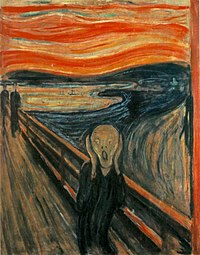
Photo from wikipedia
Evidence-based research has revealed how physiological and emotional responses to acute stress are adaptive. However, under conditions of unpredictable or protracted stress, health and drug vulnerability can be compromised. In… Click to show full abstract
Evidence-based research has revealed how physiological and emotional responses to acute stress are adaptive. However, under conditions of unpredictable or protracted stress, health and drug vulnerability can be compromised. In this study, we examined anxiety-like behavioral responses of 4th generation adolescent male and female Long Evans rats selectively bred for high (HAn) and low (LAn) anxiety-like behavior when housed in an isolated environment (IE) versus a social environment (SE). After 35 days in IE or SE, animals were tested in the elevated plus maze (EPM), injected with amphetamine (AMPH: 0.5 mg/kg, IP) in the locomotor activity (LMA) chamber, measured for basal and post air puff-stressor core body temperature and blood pressure. Following select rearing, SE reduced the anxiogenic response in HAn rats with females displaying the lowest anxiety-like behavior in the EPM. During habituation in the LMA, IE rats remained active, while post-AMPH injection HAn females were hyperactive, followed closely by LAn females. Our findings from the post-stressor physiological measurements indicate that temperature differences due to environment are observed only in the SE females. We also observed group differences for diastolic (DBP) and systolic (SBP) blood pressure. HAn IE males experienced higher DBP and SBP but LAn IE females only experienced higher SBP. Not only do our findings corroborate earlier work on HAn/LAn lines but the findings obtained from this research offer new insights about the role of environment and the role of sex in (1) modulation of anxiety-like behavior, (2) AMPH sensitivity, and (3) basal and stress-induced physiological changes.
Journal Title: Neuroscience
Year Published: 2018
Link to full text (if available)
Share on Social Media: Sign Up to like & get
recommendations!